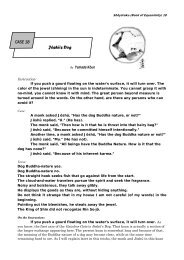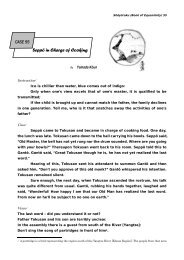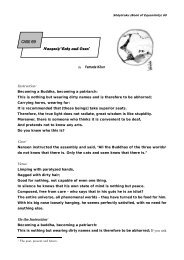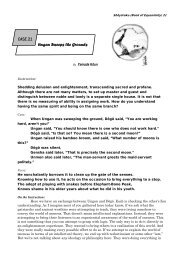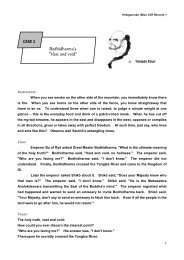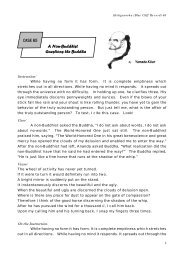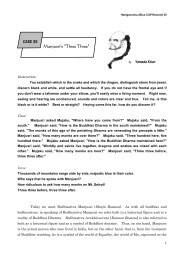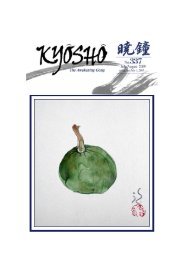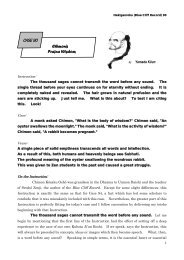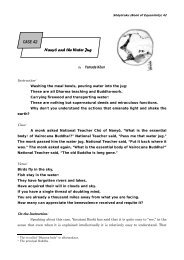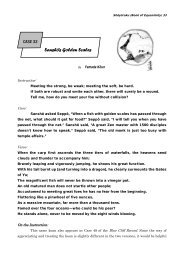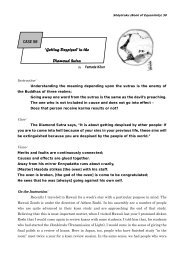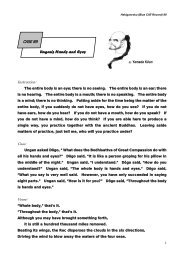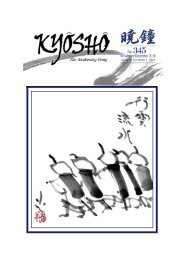You also want an ePaper? Increase the reach of your titles
YUMPU automatically turns print PDFs into web optimized ePapers that Google loves.
Shôyôroku (Book of Equanimity) <strong>41</strong><br />
CASE <strong>41</strong><br />
Rakuho On His Deathbed<br />
By Yamada Kôun<br />
Instruction:<br />
Sometimes one is sincere and faithful, distressing oneself;<br />
One’s suffering and pain is beyond words.<br />
Sometimes misfortune arises, people being devoid of comprehension.<br />
At the deathbed one condescends and retails cheaply: at the very end one<br />
is most polite.<br />
Tears welling out of painful guts, it is impossible to hide any more.<br />
Now, is there anyone who has cold eyes?<br />
Case:<br />
When he was about to die, Rakuho addressed his assembly and said, “I<br />
have one matter to ask you about. If you say, 'IT's this,' you are putting another<br />
head on your own. If you say, 'IT isn't this,' you are looking for life by cutting off<br />
your head.” The head monk said, “'The green mountain always lifts up its legs;<br />
you don't need to carry a lantern in the daylight.'“ 1 Rakuho said, “What occasion<br />
is this to utter such a saying?” A senior monk named Genjô stepped forward and<br />
said, “Apart from these two ways, I beg you, Master, not to ask.” Rakuho said,<br />
“That's not enough. Say some more.” Genjô said, “I cannot say it fully.” Rakuho<br />
said, “I don't care whether or not you can say it fully.” Genjô said, “I feel just like<br />
an attendant who has nothing to respond to his master.” 2<br />
That evening, Rakuho called Genjô to him and said, “Your response today<br />
had something quite reasonable. You have to realize what our late master 3 said,<br />
'There are no dharmas before the eyes; the consciousness is before the eyes. IT<br />
is not the Dharma before the eyes; IT cannot be reached by eyes and ears.'<br />
Which phrase is the guest? Which phrase is the host? If you can sort them out, I<br />
will transmit the bowl and robe to you.” Genjô said, “I don't understand.” Rakuho<br />
said, “You must understand.” Genjô said, “I really don't understand.” Rakuho<br />
1 Most probably a saying formed by Rakuho himself.<br />
2 Apparently an idiomatic expression meaning, “I can't describe it in words.”<br />
3 Rinzai or Kassan.
Shôyôroku (Book of Equanimity) <strong>41</strong><br />
shouted and said, “Miserable, miserable!”<br />
[Another] monk asked, “What would you like to say, Master?” Rakuho said,<br />
“The boat of compassion is not rowed over pure waves. It's been wasted labor<br />
releasing wooden geese down the precipitous strait 4 .”<br />
Verse:<br />
With the clouds as bait, with the moon as a hook, one fishes in the pure water;<br />
Old with age, solitary-hearted, one hasn’t caught a fish yet.<br />
After returning [to the ordinary world, finishing] the poem “Forsaking the<br />
Clamor” 5 ,<br />
[Lo,] the only sober one upon the Bekira River 6 .<br />
On the Instruction:<br />
Rakuho also appears in Case 35 of the Book of Equanimity. That case is entitled<br />
Rakuho’s Obeisance and recounts how he met his match with Kassan and became his student.<br />
Actually, however, the records tell us that Rakuho was Rinzai’s attendant for 20 years and was<br />
known as “Rinzai’s single eye.” He was also known as the “sharp point of the arrow” of the<br />
Rinzai school. But it was only after he started to practice under Kassan that he “pushed out the<br />
bottom of the bucket,” so to speak, realizing full enlightenment. Although he had practiced<br />
under Rinzai for twenty years, he had yet to really fully realize. That only happened after he<br />
went to Kassan. Rakuho then returned his certificate of enlightenment (inka shômei) to Rinzai<br />
and became Kassan’s disciple. That’s the kind of fellow he was. In today’s case, however, we<br />
encounter Rakuho shortly before his death. There is the passage in the Analects of Confucius:<br />
“When a bird is about to die its song touches the heart. When a man is about to die, his words<br />
are of note.” 7<br />
There was the belief that the words of a dying man were especially good. It is said that<br />
although Rakuho exerted himself for a lifetime, he was unable to produce a single successor.<br />
There are some records that say the senior monk Genjô who appears in this koan was actually<br />
his successor, but there is no mention anywhere of what kind of person he was, where he came<br />
from and where or how he passed away. I have no way of knowing whether he actually was a<br />
dharma successor, but the Genjô who takes the stage in this koan appears to have not yet<br />
realized enlightenment. As for Rakuho, his full name was Rakuho Genan Zenji, a dharma<br />
successor of Kassan Zen’e Zenji. I already mentioned their exchange appearing in Case 35 of<br />
this collection, but I can say here that Kassan was more or less of the Soto lineage. There were<br />
the two masters Seigen Gyôshi Zenji and Nangaku Ejô Zenji. It was from Nangaku that the<br />
Rinzai stream flowed, and from Seigen that the Soto stream flowed. In that sense, Kassan and<br />
4 It was a custom that the boat rushing down the stream through a gorge released pieces of wood ahead as a warning so that a possible crash with the<br />
boat coming upstream could be avoided. These wooden chips were called “wooden geese.”<br />
5 A poem which Kutsugen (cf. Verse to Case 12) composed after he was dismissed from his royal office.<br />
6 The river where Kutsugen committed suicide.<br />
7 Waley, Arthur, The Analects of Confucius.<br />
2
Shôyôroku (Book of Equanimity) <strong>41</strong><br />
Rakuho were both of the Soto lineage. It was Sekitô Kisen Zenji who inherited the dharma of<br />
Seigen Gyôshi Zenji, and Seigen was followed by Yakusan Igen Zenji, whose successor was<br />
Katei Tokusei Zenji. This was a time in which Buddhism was persecution, so that Katei became<br />
a boatman, living on a boat on a river. For this reason he is also commonly known as Sensu<br />
Oshô, where the words Sensu also have the meaning of boatman. And it was Kassan who went<br />
to Sensu and inherited his dharma. There are a number of interesting stories about him, but I<br />
will omit them here for lack of time. As mentioned, it was Rakuho who then inherited Kassan’s<br />
dharma. This case, as mentioned, deals with the time shortly before Rakuho’s death. As usual,<br />
the Instruction has its sights set on the Main Case in making its statements.<br />
Sometimes one is sincere and faithful, distressing oneself;<br />
One’s suffering and pain is beyond words. The word translated here as “sincere<br />
and faithful” (jap, chûsei) is something Japanese will surely be familiar with. We talk about<br />
pledging loyalty to the Emperor or swearing allegiance (makoto wo tsukusu). It’s a matter of<br />
forgetting about yourself and not caring about life and limb in doing your duty. In this case,<br />
Rakuho does not care for life and limb for the sake of the dharma, doing his absolute best. This<br />
is what the first line means. He undergoes a lot of suffering, spurring himself on and acting out<br />
of total compassion for the others. Such “suffering and pain is beyond words” for the sake of his<br />
students. That’s certainly true. He is making every possible effort, suffering greatly in the<br />
process, for the sake of the dharma. Please recall in this connection the Verse to Case 17 of the<br />
Gateless Gate (The National Teacher’s Three Calls):<br />
We must carry an iron yoke with no hole.<br />
It is certainly no trifling matter to guard true Buddhism. It is equal to the sufferings of<br />
wearing a heavy iron yoke through your life. Then comes the next line:<br />
It is not a slight matter; the curse is passed on to our descendants.<br />
This is not referring to blood relatives. Instead, the poet is saying that the sufferings of<br />
maintaining the dharma shall be passed on to our descendants in the dharma, which is indeed<br />
no slight matter.<br />
If you want to support the gate and sustain the house,<br />
You must climb a mountain of swords with bare feet.<br />
If you want to support the gate and the house of Buddhism, you must bear up under<br />
pains that are like climbing a mountain of sharp swords in your bare feet. This is similar to the<br />
spirit of today’s Instruction, where it says we have to bear up under unspeakable sufferings.<br />
Sometimes misfortune arises, people being devoid of comprehension. The<br />
“misfortune” (wazawai) means the sufferings of people coming to practice zazen, met with a cry<br />
of “kaatz!” or with a blow of the master’s stick. But even then, they are devoid of<br />
comprehension; they fail to get the point. They think you are talking gibberish and don’t<br />
understand.<br />
At the deathbed one condescends and retails cheaply. As you make ready to<br />
depart for the next world, although you might have maintained a stern and severe attitude up<br />
3
Shôyôroku (Book of Equanimity) <strong>41</strong><br />
to then, when it comes time to die, you cast aside your usual strictness, dashing it into twos and<br />
threes. I would like you to savor the section of the Main Case that this Instruction is talking<br />
about here. The master wants somehow to bring at least one person to a true realization of the<br />
essential matter and thus leave a successor. Desiring to somehow to open their eyes, he’s ready<br />
to sell it at a cheap price at the last. It may not be a case of the “banana sale approach” 8 , but he<br />
is certainly giving the dharma away at a bargain price. But even in such a case, there are<br />
hardly any students who come to an enlightenment experience.<br />
Then comes the second part of the line:<br />
At the very end one is most polite. The “very end” means just before dying, at<br />
death’s door. The poet says one is “most polite” at such a time. When things are like this, it is<br />
said, one cannot expect any real students to result. It’s said that the best Zen masters are those<br />
who are still young in their 40’s and 50’s, because they are still capable of taking a stern and<br />
authoritative attitude toward their students. When you get older you’re no longer able to do<br />
that! You start telling your students things that are not to their benefit, desiring that they<br />
somehow understand. This is a most troublesome illness. The same thing will happen to us.<br />
This is the feeling evoked in the words “at the very end one is most polite.” I don’t known how<br />
long it was before his death, but when Nagasawa Sogen Roshi passed away, he reportedly told<br />
his students shortly beforehand that this would be his last teisho and the last time he would<br />
receive students in dokusan. Evidently he was aware intuitively that his days were numbered.<br />
At any rate, the words, “at the deathbed one condescends and retails cheaply” evoke how the<br />
master, who has sternly maintained authority of the dharma up to then, is ready to sell it for a<br />
throwaway price at this point. You might say he is going out of his way to be especially polite.<br />
Tears welling out of painful guts, it is impossible to hide any more. It is as if<br />
his tears are welling up out of his very entrails, from the depth of his painful soul. What tears<br />
are these? They are the tears of the parent for his child, of the master for his students. I feel<br />
these are referring to the tears of the Zen master out of his concerns for the dharma. He wants<br />
somehow to pass on his dharma in some way. But if there are no disciples to whom he can pass<br />
his dharma on to, this is a very sad state of affairs. This is what this line of the Verse is talking<br />
about. He is no longer able to hide his tears of sadness at this turn of events. This is of course<br />
referring to Rakuho in the Main Case. And then he considers:<br />
Now, is there anyone who has cold eyes? In other words, is there any one<br />
present here who, upon seeing me weep bitter tears, can remain dry-eyed and tell me with<br />
assurance that there’s nothing to worry about since he’s here? After all, what good is it going to<br />
do to babble about this or that when he’s on his deathbed? Yasutani Roshi always used to say<br />
that when you die, you should do so silently. Rakuho seems to be chastising his students: What<br />
are you speaking so effusively about? Isn’t there anyone who can stand tall and say, “Don’t<br />
worry, I’m here”?<br />
8 Banana no tatakiuri, referring to how fruit sellers in Japan used to ask outrageous prices for<br />
bananas but then dramatically lower the price if there were protests.<br />
4
Shôyôroku (Book of Equanimity) <strong>41</strong><br />
On the Case:<br />
When he was about to die, Rakuho addressed his assembly and said, “I<br />
have one matter to ask you about.” We don’t know for sure just by reading the text<br />
whether Rakuho was on his deathbed or whether he was giving his last teisho shortly before<br />
his death. In the old days in the temples, if someone was breathing his last, they would put him<br />
on a stretcher and bring him into the zendo under certain circumstances. I remember Kôno<br />
Sôkan Roshi telling us that there was such a practice at Shôgenji Temple in Ibuka, Gifu<br />
Prefecture. They would evidently bring the Roshi on a stretcher to the preaching hall. And once<br />
you were brought there, you weren’t long for this world. So, in today’s koan, either we have a<br />
case where all the monks have assembled shortly before Rakuho’s death, or perhaps he is<br />
delivering his final teisho. We don’t really know if he has appeared to preach in the Zen hall<br />
despite illness. At any rate, he speaks to the assembled monks as follows: “I have one matter to<br />
ask you about.” His words continue:<br />
If you say, 'IT's this,' you are putting another head on your own. Remember,<br />
these are Rakuho’s final words. What is “IT”? It’s our true self, our essential nature. But if you<br />
refer to it like that, it’s like putting another head on your own head, because you descend into<br />
dualisms. It’s like having two heads. Then there is subject and object. There is the one who sees<br />
and the one seen. But these are actually one. Many of you are practicing with the koan Mu to<br />
become one with Mu. But it’s not a matter of making the “two heads” one through your practice.<br />
It’s one from the very start. It’s just that you mistakenly believe they are two. Mu is one from<br />
the very beginning, and that is you yourself. This is actually what it all gets down to, although<br />
just saying it like that doesn’t really help. You can consider it as follows: To think that there are<br />
two different things is a form of illness, the illness by which something that is intrinsically one<br />
is seen as dualistic. I assign you the practice of MU in order that you can break out of that<br />
dream and realize the world of oneness. So if you think in terms of THIS or THAT, it’s already<br />
two: the one seeing and the thing seen. But what about the other case?<br />
If you say, 'IT isn't this,' you are looking for life by cutting off your head.” If<br />
you try now to put it negatively (IT isn’t this), it’s like cutting off your own head. And then you<br />
look frantically for life, in other words, you seek desperately for another head. If you say IT’s<br />
not that, then you have to look for something else. At any rate, it won’t do to try to stamp out<br />
the world of oneness. Then one of the monks spoke up:<br />
The head monk said, “'The green mountain always lifts up its legs; you<br />
don't need to carry a lantern in the daylight.'“ What is the “green mountain”? The green<br />
mountain does not move, but here he says that the green mountain always lifts up its legs, is<br />
always walking. This is pointing to our own essential nature. Although the content is empty, it<br />
is always walking. You might think this is a strange world, but it’s simply referring to you<br />
yourselves. Even Dôgen Zenji says the same thing: Green mountain is always walking. The<br />
empty guy is walking. Although he continues to walk from morning to night, there is a world in<br />
5
Shôyôroku (Book of Equanimity) <strong>41</strong><br />
which he does not take a single step. This is what is being referred to here.<br />
You don’t need to carry a lantern in the daylight. The true fact is completely<br />
clear, just like in broad daylight. There’s certainly no need to light a lantern and go looking for<br />
it. Don’t you see how clear it is? But actually Rakuho said something a little different, as is<br />
mentioned in Old Man Banshô’s comments on the case. His words were evidently as follows:<br />
“The green mountain is always moving its feet; the bright sun doesn’t shift its orb.”<br />
The sun moves from east to west. But Rakuho says, “It doesn’t shift its orb,” it doesn’t<br />
move at all. I, too, feel this statement of Rakuho in the commentary to be more to the point<br />
than the saying of the monk in the koan. Nevertheless, we must keep with the statement in the<br />
koan as it appears in the Main Case. As just mentioned, it is as clear as day, and there’s no<br />
need to light a lamp and look for it.<br />
Rakuho said, “What occasion is this to utter such a saying?” “What time is<br />
this to be talking about such things?!”, Rakuho says. “Here I am about to depart for the next<br />
world. This is no time to be repeating such hollow phrases and insolent words!” Words like<br />
“green mountain is always walking” might be all well and good, but it’s no help if it’s just some<br />
concept. “What time do you think this is to be talking about such things?” Rakuho chides the<br />
monk. What’s gotten into your head to jabber about such matters when I’m about to depart for<br />
the next world?<br />
A senior monk named Genjô stepped forward and said, “Apart from these<br />
two ways, I beg you, Master, not to ask.” The head monk failed the test, so to speak, so<br />
now the senior monk Genjô steps forward. What are the “two ways”? You can see them as “yes”<br />
and “no.” If you say it’s this, that’s wrong. If you say it’s not this, that’s also wrong. “But is there<br />
anything else that you can say?” the monk wants to know. Is there any need to search farther<br />
than that? This is what he is asking with his question. But Rakuho does not accept this.<br />
Rakuho said, “That's not enough. Say some more.” He pushes the senior monk<br />
to say more.<br />
Genjô said, “I cannot say it fully.” “I cannot say anything more than this.”<br />
Rakuho said, “I don't care whether or not you can say it fully.” “Whether you<br />
can say it fully or not is not my problem, it’s yours.” He rejects the monk’s statement.<br />
Genjô said, “I feel just like an attendant who has nothing to respond to his<br />
master.” He seems to say that he is no longer worthy to act as his attendant. He means that,<br />
although he would like to say it, he finds it difficult to do. Such a phrase is used to express a<br />
situation in which you might know it, but cannot find the words to express it. This ends this<br />
particular scene.<br />
That evening, Rakuho called Genjô to him and said, “Your response today<br />
had something quite reasonable. You have to realize what our late master said,<br />
'There are no dharmas before the eyes; the consciousness is before the eyes. IT<br />
is not the Dharma before the eyes; IT cannot be reached by eyes and ears.'<br />
Which phrase is the guest? Which phrase is the host? If you can sort them out, I<br />
6
Shôyôroku (Book of Equanimity) <strong>41</strong><br />
will transmit the bowl and robe to you.” When Rakuho tells the senior monk that his<br />
response had something quite reasonable, this is what I meant by “selling it at a bargain.” He<br />
seems to feel that the monk has grasped something, but is unable to express it. He then tells<br />
Genjô that he must realize what the late master (i.e., Kassan) said. The words that follow are<br />
all the words of Kassan:<br />
'There are no dharmas before the eyes; the consciousness is before the<br />
eyes. IT is not the Dharma before the eyes; IT cannot be reached by eyes and<br />
ears.' These statements have to be examined together with the Zen master in the dokusan<br />
room. “Dharmas” (hô) means all things in the phenomenal world. “Consciousness” (i) means the<br />
mind (kokoro). This is quite an interesting expression. He is talking about there not being a<br />
single thing before your eyes. It’s a matter of presenting this in the dokusan room. And then he<br />
says, “the consciousness is before the eyes.” In other words, there are no things before the eyes;<br />
there is mind (kokoro) before the eyes. “IT” means “that thing,” a reference to your true self. He<br />
says that IT is not things before the eyes. IT is not something that can be reached by eyes and<br />
ears. The essential world cannot be grasped with our senses, it cannot be seen or heard.<br />
Which phrase is the guest? Which phrase is the host? The guest is the<br />
objective world; the host is the subjective world. Remember, these are the words of Kassan.<br />
There is the following story about Kassan.<br />
Kassan set out to meet Sensu Oshô, the master whose dharma he inherited. Sensu<br />
asked him, “In what temple do you live?” Kassan said, “I do not live in a temple. If I lived in it,<br />
it is not like IT.” “What is it not like?” Sensu wanted to know. What is not similar to? He’s<br />
talking about essential nature. There is no stopping and dwelling. Because it is empty. But you<br />
talk in terms of living in a temple; it is not like your essential nature. But Sensu wants to know<br />
what it is not like. Words like “essential nature” can lead to concepts, and are not used in such<br />
an exchange. It is then that Kassan says the words that are found in today’s koan:<br />
'There are no dharmas before the eyes; the consciousness is before the<br />
eyes. IT is not the Dharma before the eyes.” But Sensu was not satisfied and pressed<br />
him further: “Where did you learn those words?” It is then that Kassan says the following<br />
words:<br />
“IT cannot be reached by eyes and ears.” It appears that Kassan was saying<br />
this all the time, and that’s probably the reason Rakuho produces these words here. Then he<br />
asks: “Which phrase is the guest? Which phrase is the host? If you can sort them out, I will<br />
transmit the bowl and robe to you.”<br />
In other words, if you can say clearly which phrase is the host and which the guest, I<br />
will transmit my dharma to you (as symbolized by the robe and bowl). But the senior monk<br />
Genjô does not know what to say. Even though Rakuho has lowered the price considerably to<br />
sell the dharma at a bargain, he still doesn’t know. Rakuho was no doubt very vexed at this.<br />
Rakuho said, “You must understand.” “Don’t tell me you don’t understand. You<br />
must know the answer.”<br />
7
Shôyôroku (Book of Equanimity) <strong>41</strong><br />
Genjô said, “I really don't understand.” Rakuho must have felt very sad.<br />
Rakuho shouted and said, “Miserable, miserable!”<br />
[Another] monk asked, “What would you like to say, Master?” Another monk<br />
(not Genjô) then spoke up and asked the Master what he was getting at with his statement.<br />
Rakuho said, “The boat of compassion is not rowed over pure waves. It's<br />
been wasted labor releasing wooden geese down the precipitous strait.” I will<br />
explain the individual lines afterward and present the basic meaning of what he wants to say<br />
here. He is saying in effect that he has now given up trying to teach the dharma or lead others.<br />
Although he made all sorts of efforts, it was all in vain.<br />
The “boat of compassion” on the waves is said in the sense of going out on the lake in a<br />
boat to catch a wonderful fish. But if the boat is “not rowed,” it means that he has given up<br />
trying to catch such a fish. Although he had plied the boat over the waters of the lake, clear like<br />
a mirror, he has now given up trying to go out in that boat. “Releasing wooden geese down the<br />
precipitous strait” means that a goose carved of wood is let out on the water when the boat is<br />
going through narrow straits with rapids. This is used to check whether a boat is coming from<br />
the other direction and prevent a collision. Although all these precautions and steps were taken,<br />
it availed him naught. Although on one hand he is bewailing the lack of a dharma successor,<br />
from the essential viewpoint, there is no such need. The fact that “all beings are intrinsically<br />
Buddha” lies to the backround of his statement. This is how Yasutani Roshi views the koan.<br />
That’s certainly a possibility.<br />
However, I can’t help feeling that these words of Rakuho express his despair here, at<br />
the end of his life, on failing to produce any dharma successors. Thus, the words in the<br />
Instruction (“tears welling out of painful guts”) are very fitting to describe this scene.<br />
On the Verse:<br />
With the clouds as bait, with the moon as a hook, one fishes in the pure<br />
water. If we attempt to explain the meaning of this line intellectually, we can say the poet<br />
paints a picture of a person standing aloof from the ordinary world, living as he pleases in<br />
nature in the living samadhi of saving all beings in perfect freedom. In his commentary on the<br />
verse Old Man Banshô says:<br />
An ancient used a rainbow as a pole, the new moon as a hook, a piece of cloud for bait;<br />
in the clear waters one can thus pole the boat of compassion; in the precipitous straits one must<br />
first release a wooden goose. (Cleary translation)<br />
This could be referring to Rakuho or to Sensu. At any rate, we have an image of<br />
someone living in perfect freedom and ease in the midst of nature, sitting in the bright<br />
moonlight with a gentle breeze blowing. But we shouldn’t assume he’s become a hermit. He<br />
wants to somehow “land a great fish” in the sense of wanting to somehow save all beings, acting<br />
freely and without obstruction. But there’s not even a nibble on his hook!<br />
Old with age, solitary-hearted, one hasn’t caught a fish yet. Old and solitary,<br />
8
Shôyôroku (Book of Equanimity) <strong>41</strong><br />
he would love to catch a fish, in the sense of having at least one dharma successor, but he’s<br />
unable to do so. How sad!<br />
After returning [to the ordinary world, finishing] the poem “Forsaking the<br />
Clamor”,<br />
[Lo,] the only sober one upon the Bekira River. The poem Li-Sao, translated<br />
here as “Forsaking the Clamor,” is also translated as “Encountering Sorrow.” The author was<br />
Qu Yuan, a high official in the Kingdom of Su. But due to the slanderous tongues of others at<br />
the court, he was banished to Changsha. Heartsick and despondent, Qu Yuan wrote the poem<br />
known as Li Sao, or Forsaking the Clamor. He happened to meet a fisherman on the banks of<br />
the river one day, who asked him what he was doing. In reply, Qu Yuan said, “All the world is<br />
drunk; I alone am sober. All the world is polluted; I alone am pure.” Upon saying this, he<br />
plunged into the Bekira River and drowned. This is what these final lines of the Verse are<br />
referring to. Where is he “returning”? To the essential homeland, the world of emptiness. He<br />
is returning to the world of emptiness whence he came. The unfortunate Qu Yuan, who<br />
drowned in the river, was the only sober one among all the drunken ones. This is referring to<br />
Rakuho. He lets down his fishing line to fish up an outstanding fish, but is all one. Please take<br />
time to savor this koan and the Verse.<br />
9



